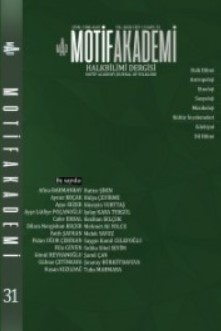VİDÂDİ, VÂGİF VE ZÂKİR’İN “TURNALAR” ŞİİRLERİ ÜZERİNE BİR İNCELEME
THE STUDY OF ‘TURNALAR’ POEMS OF VIDADI, VAGIF AND ZAKIR
Author(s): Afina BarmanbaySubject(s): Cultural history, Customs / Folklore, Poetry, Comparative Study of Literature, Other Language Literature, 18th Century, 19th Century, Theory of Literature
Published by: Motif Halk Oyunları Eğitim ve Öğretim Vakfı
Keywords: Crane; homesickness; Vidadi; Vagif; Zakir;
Summary/Abstract: People can experience spiritual emotions when they are away from home or under the influence of homesickness they feel. While looking for some escape in the sky above them, talking to birds that people find mysterious may grant them some relief. The act of flying attracts people with its mystic attractiveness. The flying birds revive people’s dreams and hopes. Probably that is why, the birds that are seen as a means of communication of various emotions are frequently used in both folk literature and written literature. Especially in poems about homesickness and strangeness, migratory birds and cranes in particular are seen as both harbingers and confidants. The poems about cranes also manage to reflect the social, historical and political events of each period. At the time of folk poetry development, the symbol of a crane in Azerbaijani written literature reached its peak in “Turnalar” (Cranes) poems of Molla Veli Vidadi (1709-1809), Molla Penah Vagif (1717-1797) and Kasım Bey Zakir (1784-1857). All three poems in which the crane motif is used are original literary works that in spite of some similar aspects differ from each other in terms of the emotions they convey and the events they reflect. In this study, the social, historical and political conditions of that period have been examined in their relation to the poets’ lives and spiritual and psychological states. Through the example of these three poems, the way the poets reflected their mood in the literary art has been traced.
Journal: Motif Akademi Halkbilimi Dergisi
- Issue Year: 13/2020
- Issue No: 31
- Page Range: 1141-1155
- Page Count: 15
- Language: Turkish

